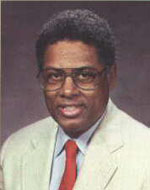|
|
Thomas Sowell
WHITE HOUSE spin-masters and their media supporters are attacking Kathleen Willey
because of her account of Bill Clinton's grossness in the oval office.
"Why did she wait so long to come forward?" is the chorus from the Clinton supporters.
She waited exactly half as long as Anita Hill. But asking that question about Ms. Hill was
The other question being asked about Kathleen Willey is: "What is her motive for coming
forward?" Anita Hill's motive was clearly to stop Judge Clarence Thomas from being
confirmed as a justice of the Supreme Court.
Mrs. Willey's motives are also quite clear and quite different: She was subpoenaed and had
no choice but to testify. She got herself a lawyer to fight the subpoena but he lost and she
was then forced to testify under oath. The only question at that point was whether she was
going to tell the truth or commit perjury.
Apparently to the disappointment of the Clinton supporters, she told the truth. The best
the Clinton camp could do was to get Monica Lewinsky to try to convince Linda Tripp to
deny having seen Mrs. Willey coming out of Clinton's office looking disheveled. Instead,
Ms. Tripp protected herself by taping Monica instead of committing perjury.
Why then did Mrs. Willey go on "60 Minutes"? She was no fool and realized how the
Clinton White House was engaging in character assassination against anyone who crossed
them, whether Paula Jones, Kenneth Starr, Linda Tripp, or anybody else. She had a chance
to tell her story to the public and she told it before the smears could begin.
If there was any doubt as to who was telling the truth, Clinton lawyer Bob Bennett's
attempted denial on "60 Minutes" should have dispelled those doubts. He could hardly
look up from the floor as he tried to put the Clinton spin on the story.
Now the White House has released letters that Mrs. Willey wrote to the president after the
incident she described on "60 Minutes." But Anita Hill's repeatedly contacting Clarence
Thomas after she no longer worked for him never carried any weight with media liberals
and feminists, did it?
Mrs. Willey was in a far more desperate situation than Anita Hill and the President of the
United States could do far more to help her get a job than Clarence Thomas could do for
Professor Hill in the academic world. Mrs. Willey was a widow whose husband had left her
with more than a quarter of a million dollars of his debts.
How does the Kathleen Willey story itself differ from the Anita Hill story? First of all,
Kathleen Willey told her story the way most people tell about something that left an
indelible impression on them -- with incidental details that have no real bearing on the
issue, but which are burned into their memories because they were part of an experience
that they are not likely to forget.
For example, Mrs. Willey remembered the cup of coffee that Clinton had gotten and the
fact that Lloyd Bentsen was waiting outside the oval office when she emerged. If you are
lying, it makes no sense to talk about some coffee that the president got because it could
turn out that Bill Clinton doesn't drink coffee and had none in the pantry.
If you are lying, you don't talk about seeing Lloyd Bentsen because he could have been in
California that day. In Anita Hill's story, nothing that Clarence Thomas was supposed to
have said or done ever happened on a specific day, nor even "right after Christmas" or "just
before Labor Day" or at any other time that could be pinned down and checked out.
Anita Hill's star witness tripped herself up just by saying that she and Anita talked about
her being harassed by Clarence Thomas while the two women lived in Washington. Then it
came out that both women lived in Washington before Anita Hill went to work for
Clarence Thomas -- and that the witness had left town by the time that Hill was hired.
Anita Hill's story was much more like Bill Clinton's story than like Kathleen Willey's. In
order to believe either Anita Hill or Bill Clinton, you have to believe that innumerable
other people lied under oath. You have to believe not only in "a vast right-wing conspiracy"
but also that this conspiracy included liberal
 Kathleen Willey and Anita Hill
Kathleen Willey and Anita Hill
 enough to get you labeled a male chauvinist, at best.
enough to get you labeled a male chauvinist, at best.
3/17/98: Search and destroy
3/12/98: Media Circus versus Justice
3/6/98: Vindication
3/3/98: Cheap Shot Time
2/26/98: The Wrong Filter
2/24/98: Trial by Media
2/20/98: Dancing Around the Realities
2/19/98: A "Do Something" War?
2/12/98: Julian Simon, combatant in a 200-year war
2/6/98: A rush to rhetoric